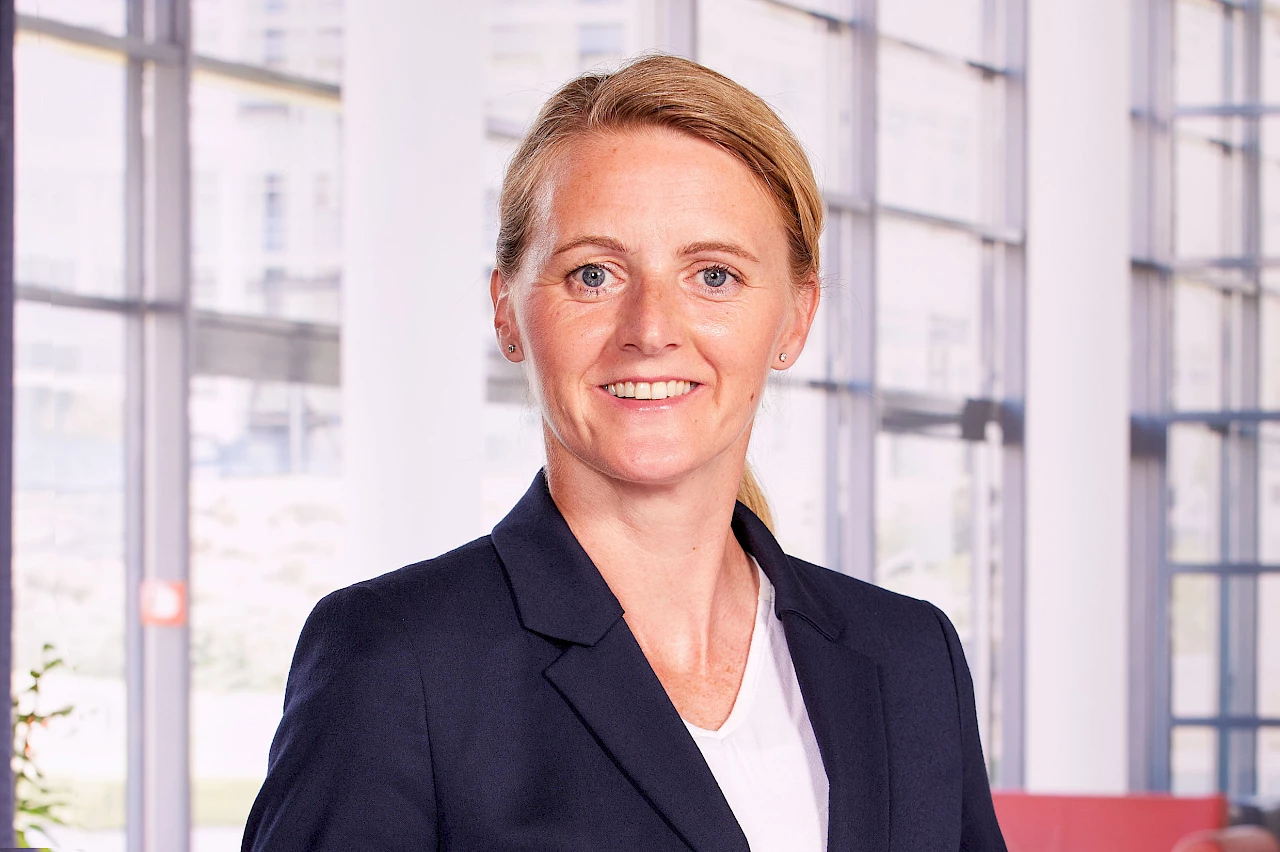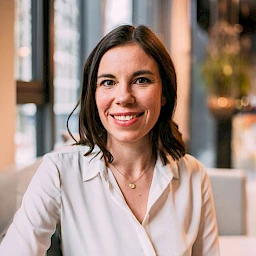The financial services provider MLP is currently creating modern worlds of work for approximately 1,000 employees on its campus in Wiesloch in order to facilitate new forms of collaboration. The “IBA Forum” editorial team spoke with Angelika Zinkgräf, the Human Resources Manager at MLP, about New Work, the importance of corporate culture and the concept of lifelong learning.
Ms Zinkgräf, how would you describe the corporate culture at MLP?
We have a corporate culture that is open and based on trust and appreciation, but also performance-oriented. That’s also the essence of our “MLP Spirit”, with which we define our collaboration: a passion for serving our customers, enjoyment of our mutual commitment and cooperation, and eagerness to become even better. These values are important to us, and they offer us orientation for the way we work together as private individuals and colleagues. We have fun together, get things done together and make progress together — that’s what makes us special.
How are your corporate values reflected in the new worlds of work?
We intensively addressed the question of how we can put our corporate values into practice in our work environments and optimise the collaboration inside teams and between the various specialist departments in a company-wide working group. In the process, we always focused on the needs of our coworkers. We were able to create new spaces suitable for concentrated individual work and also for teamwork and project work. We also created areas for interaction and shared experiences. The new spatial concept supports our flexible way of working, which is sometimes mobile, sometimes hybrid and sometimes in-person. However, the topic of spatial design goes hand in hand with the topic of technology and the development of hybrid collaboration. As a result, we adapted the technical equipment of our rooms accordingly, for example by means of new software and tools. We also introduced agile methods of working. Another aspect that we consider important is the continuous process of qualification. We invest a lot of time and resources in seminars and training sessions so that our employees can acquire the skills they need in order to continue working successfully under changing circumstances. Our managers play a crucial role in this connection. We have actively included them in these processes so that they and their teams can identify their relevant needs and define the best working methods and tools. This participatory approach enables us to address changing requirements effectively.
What was the biggest challenge facing this project?
The biggest challenge was to let go and dispose of unnecessary ballast. We had to accept and understand the fact that innovations can only come into being if we are ready to give up familiar things, let go of old habits and deal with existing conditions in new ways.
How are the employees reacting to the New Work-oriented workspaces?
We’ve had lots of positive feedback from our employees about the workspaces that have been completed so far. This is mainly due to the way we’ve supported the process and included all areas of the company in it from the very start so as to create a pleasant and supportive working atmosphere. As an employer, we consider it important to offer an attractive work environment in which the teams enjoy working and which flexibly adapts itself to the varying requirements. We’ve managed to do that very well, and we’re proud of that.
How are you making yourself fit for the future in concrete terms?
We are making intensive use of our in-house Corporate University and systematically following the lifelong learning approach. On the campus in Wiesloch our employees have access to a wide variety of learning spaces and learning programmes, including blended learning, in-person events and web-based training sessions. This combination of different methods of learning enables us to pursue professional and methodical advancement and optimally utilise every individual’s potential. We attribute particular value to digital skills and the ability to actively address and shape change. Our managers play an important role in this area as well. They act as shapers of the future and encourage their employees to recognise and take advantage of the opportunities offered by change.
Please also read
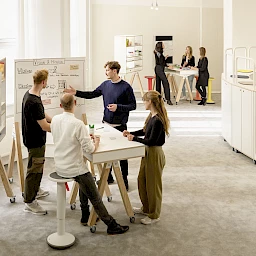
How can culture create an environment that promotes creativity and innovation?
We regard personal communication as the basis of creativity and innovation. We firmly believe that the best ideas and innovations come into being not behind closed doors but through interaction and shared activities. Consequently, on our campus we have many new spatial modules that enable employees to collaborate and provide mutual support. But our employees also communicate in other ways, usually in informal settings — for example, over a friendly cup of coffee in our Caffè Dallucci, at events such as our summer festival, the Christmas party, Campus Day, our “Lunch-and-Learn” events or during the Health Days, when we specifically encourage cross-department interactions and networking.
You are committed to the principle of lifelong learning. How does the new work environment support this principle?
Our work environment is designed to enable long-distance interaction as well. We’ve also expanded our range of seminars for our subsidiaries. This not only enables the employees to interact and get to know one another across company borders but also strengthens our sense of togetherness and our corporate culture and helps to generate new ideas and momentum. Because we have different perspectives and backgrounds at our Group, we feel that communication and learning from one another are inspiring. We offer various learning formats that can be implemented on site at various locations as well as in hybrid, remote and online settings. The physical equipment plays an important role here by enabling shared learning of various kinds and helping us to fully exploit the advantages of new working methods.
How can you successfully establish the transfer of experience and knowledge between the generations, and what preconditions must be created in companies in order to do that?
We actively address this important topic as a company. For example, in our succession planning we focus on the transfer of know-how from experienced colleagues to young ones. Meanwhile, we realize that learning also has to take place in the opposite direction, especially with regard to technological changes. We actively encourage our managers to become familiar with technical innovations and foster the transfer of knowledge between the generations.
Please also read
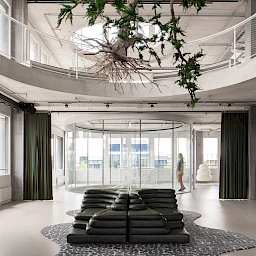
According to a forsa survey, young employees are significantly less loyal to their employer than older employees. What leadership skills do companies need in order to earn the loyalty of Generation Z?
Young employees’ expectations regarding the world of work have changed. As a result, we also need changed leadership skills in order to keep Generation Z enthusiastic about us over the long term. Traditional authoritarian management has become less important, because young employees are looking for more flexibility and agility in the way they work. Consequently, we’ve established the following five principles in our management guidelines: the manager as a model, as a human being, as a challenger, as a coach and as a future shaper. These principles and skills are important for progress and adaptation to change in the world of work. In this connection, the role of the coach is crucial in particular. Talented young people want to take on responsibility, but at the same time they need to get support, guidance and orientation from their managers. Management based on partnership, which emphasises collaboration and development and truly perceives individuals with all their strengths and weaknesses, is more important today than ever before.
To what extent does the spatial environment — that is, the office — help a company to be perceived as an attractive employer?
The spatial environment is definitely a factor in employer branding. Flexibility with regard to working methods and in the use of attractive spaces helps to make sure our employees have a sense of well-being at work and are provided with a suitable work environment in difficult situations as well. We also receive lots of positive feedback from jobseekers who come to our campus for introductory interviews. By coming here they can get a more vivid impression of how much fun it is to talk to the people who work here and experience our culture of collaboration at first hand.
Ms Zinkgräf, thank you for talking with us.
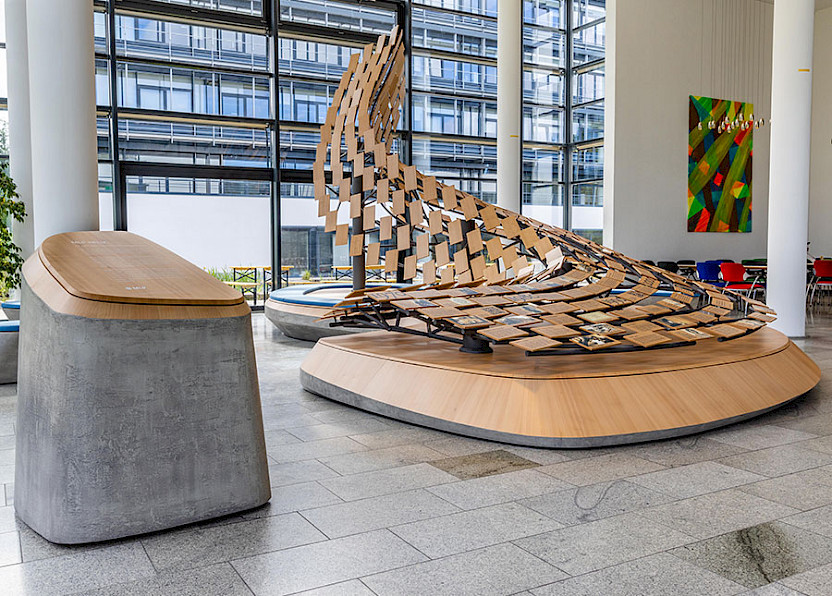
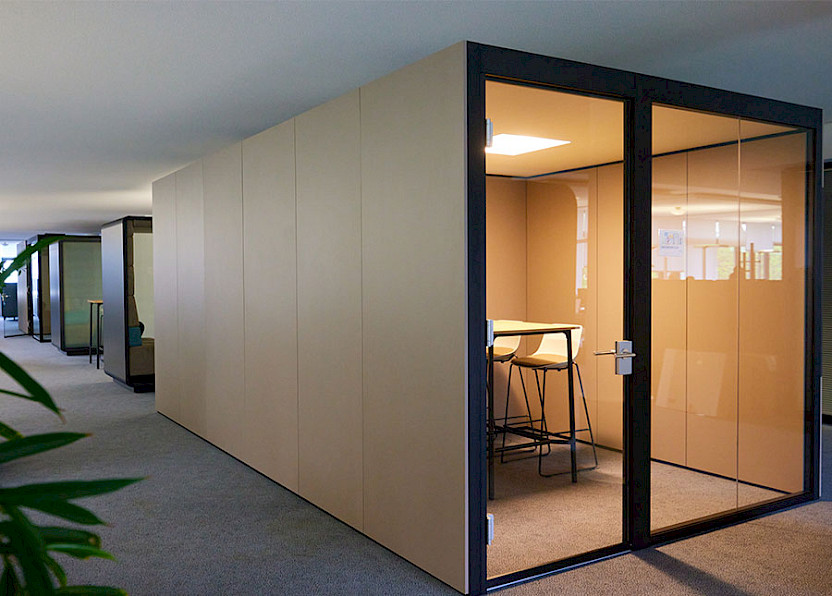
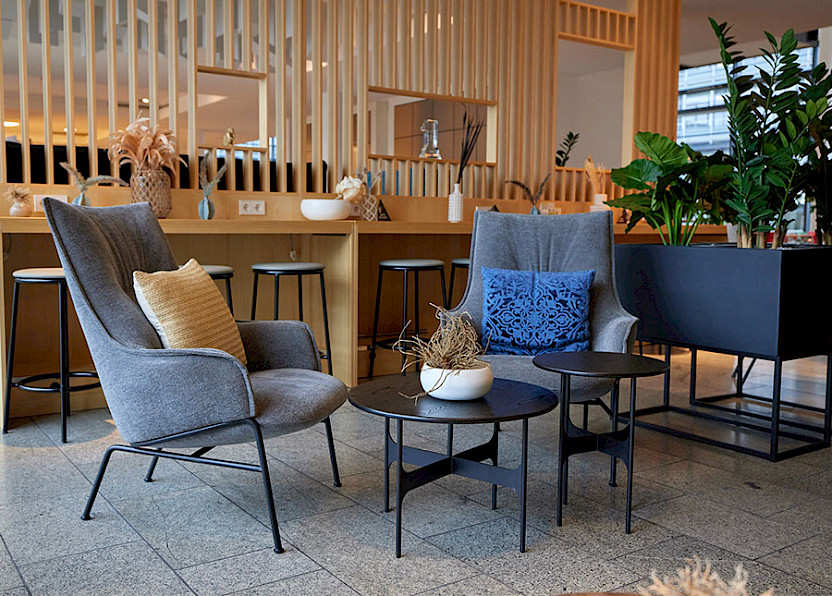
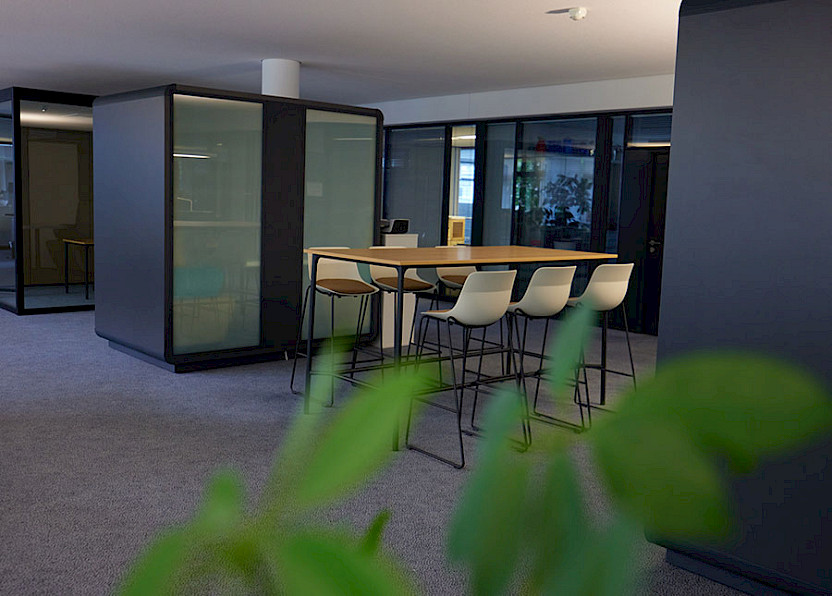
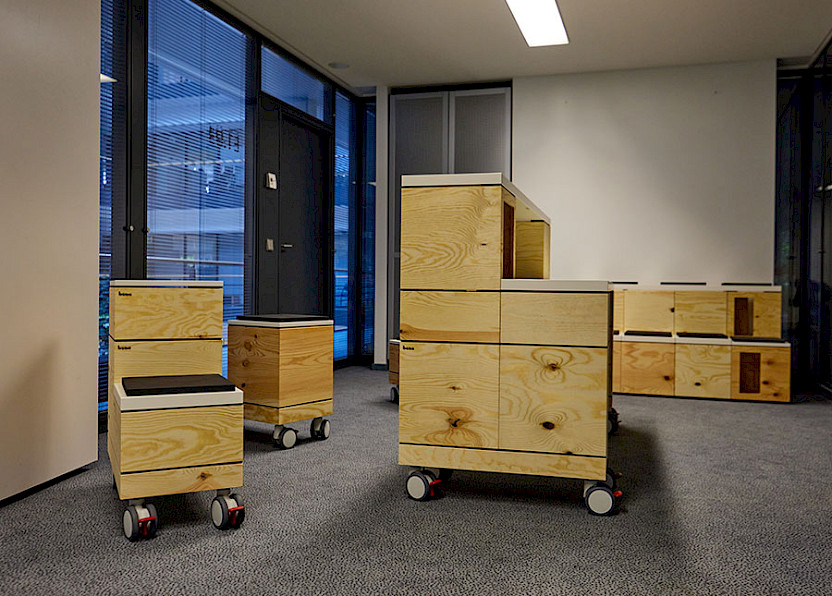
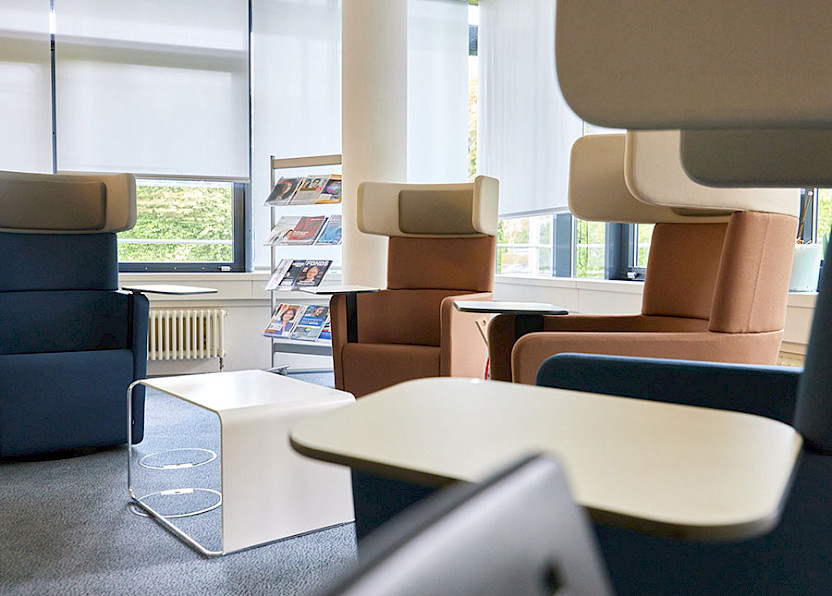
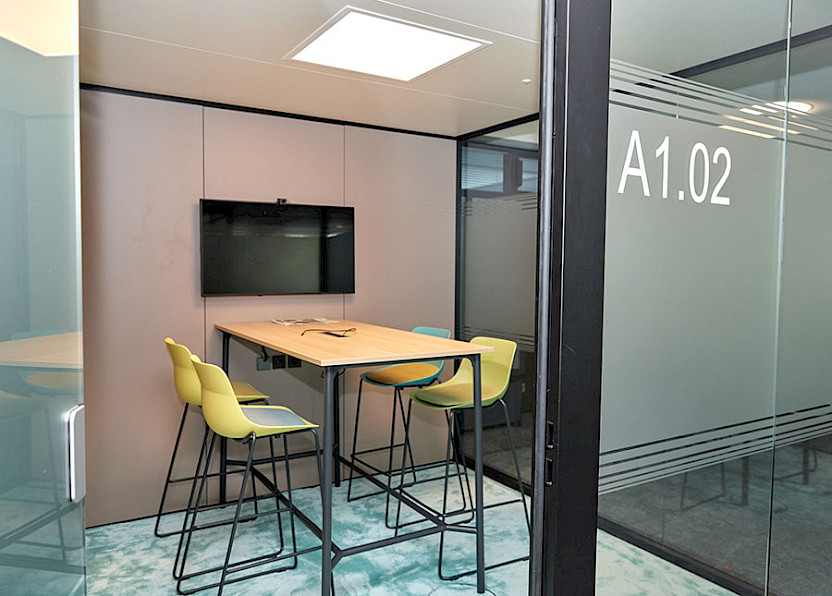
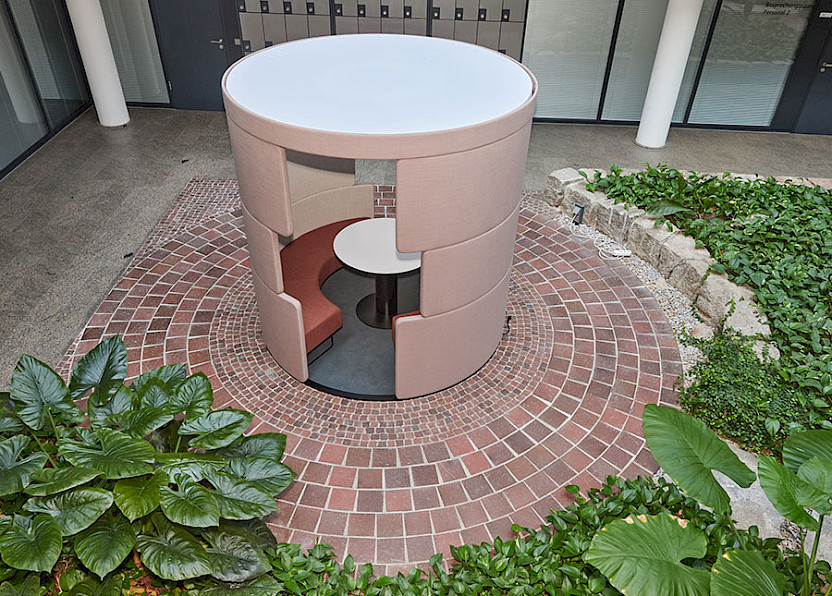
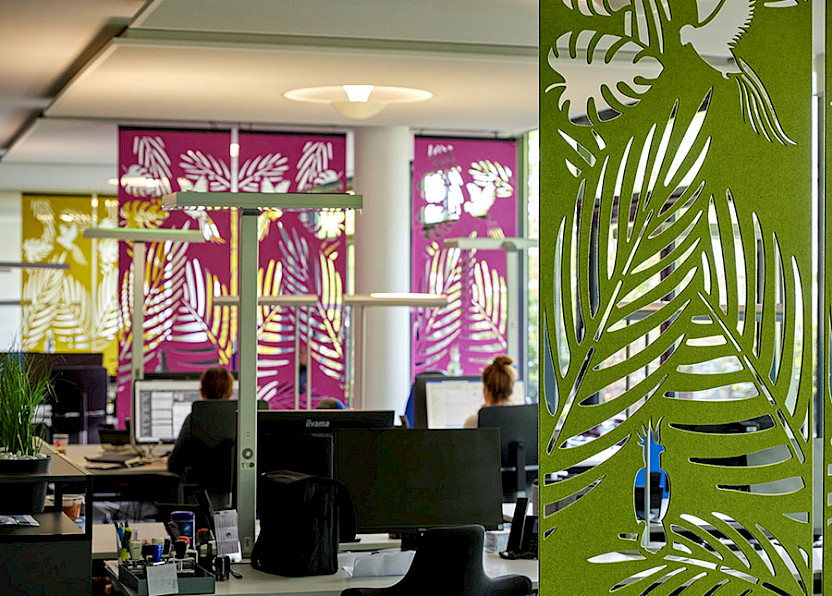
Flexibility as a Principle
The central concept behind the new worlds of work at MLP is the principle of flexibility. For one thing, the company supports flexible work models, including hybrid work, in which employees can work at the office, at home or on the road as needed. As a rule, at least half of an employee’s working time should be spent at the office, depending on the requirements of the department and the individual.
Flexibility is also directly reflected in the range of spaces on offer. In addition to traditional height-adjustable desks, the home bases have workstations of different designs that are adapted to the needs of the respective teams. The new worlds of work are modular and can be adjusted depending on the users’ requirements. Multifunctional work areas make it possible to use exactly the right room depending on the task at hand and the size of the team. Before the restructuring took place, the conference rooms were the biggest bottleneck. As a result, numerous meeting boxes were built in as room-within-a-room modules. Individual communication areas for confidential talks were created as well. The employees can try out all of the spatial modules in a pilot area and on every newly restructured floor. This enables them to formulate their own requirements more precisely. Collaboration areas, quiet zones and the Caffè Dallucci, which offers workspaces both indoors and outdoors, round off the diverse range of spaces. MLP focuses on flexibility in the area of technology as well. State-of-the-art technology makes it possible to seamlessly switch between various devices and work environments. Moreover, regular feedback and evaluation enable continuous adaptation and improvement of the work environment.
FACT and Figures:
- Planning and project management: Heike Vogelgesang – Consultant in real estate management
- Project duration: April 2021 to March 2025 (concept development, call for tenders, furnishings and implementation)
- Total area: 8,500 m2



